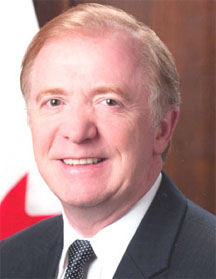Guyana can continue to rely on Canada’s support as a bilateral partner in the quest to create a local enabling environment for the strengthening of the mining, oil and gas sectors in Guyana, Canadian High Commissioner to Guyana David Devine has said
On Monday, the Canadian envoy briefed the Stabroek Business on his country’s ongoing support for the development of the extractive industries in Guyana, emphasising that future support will focus on improving the local regulatory and fiscal framework of the oil and gas sector, facilitating the education requirements of the extractive sector and aggressively pursuing and promoting corporate social responsibility in areas which include Canadian business and investment interests. Additionally, the High Commissioner stated that Canada will continue to work with relevant experts in the pursuit of the ongoing mineral mapping programme in Guyana.
Devine stated that Canada’s interest in continually strengthening its commercial and investment relationships with Guyana was reflected in a “small but active commercial section” at its High Commission in Georgetown. He further stated that the High Commission continues to monitor closely the activities of the more than 30 Canadian mining companies involved in development and exploratory work here. He added that work is also being done to further interest other Canadian exploration companies to come to Guyana.

According to the High Commissioner, some of the Canadian gold-mining operations are in the feasibility and pre-feasibility stages and, if all goes well, could come on stream around 2014. He stated that the returns from some of those properties could more than double the current gold mining output of 400,000 ounces.
Devine, who served as Canada’s Senior Trade Commissioner in Japan immediately before being posted to Guyana, told Stabroek Business that he had worked in the areas of trade and investment for more than 20 years and that “building a sustainable relationship between Canada and Guyana” which would benefit both countries was his priority as High Commissioner.
Canada is pursuing continued engagement with the Government of Guyana and other partners on the implementation of an energy regulatory model and fiscal framework, requisites, which Devine told Stabroek Business,
are critical to the success of the extractive industries in Guyana.
Devine was instrumental in attracting the London-based Commonwealth Secretariat’s Special Advisory Unit to collaborate with the Ministry of Natural Resources and the Environment in an assessment of the current regulatory framework and to provide suggestions on the best regulatory models for an oil and gas industry. In addition, the High Commission facilitated the visit to Guyana of the Chairman of the Canada-Newfoundland Offshore Petroleum Board and conducted meetings and seminars relating their experiences in developing an efficient offshore industry in Eastern Canada.
The High Commissioner told Stabroek Business that Guyana’s most important resource was its “human resources” and that, bearing this in mind, Canada intends to build on the work it has already done to facilitate the education requirements for the development of the local extractive sector. In this regard a Memorandum of Understanding has been arrived at between Canada’s College of the North Atlantic and the Marine Institute and the Ministry of Natural Resources and the Environment which has already resulted in a recent visit here by senior officials of both the college and the institute to work with local officials on the building of capacity for training personnel to sustain an oil and gas industry and enhance the mining sector’s capability.
The High Commissioner said the shortage of skilled labour is likely to be one of the more exacting challenges Guyana will face in seeking to sustain an oil and gas industry, and Canada has already begun to work on this particular obstacle with the relevant ministry by developing appropriate course programmes. He emphasised that the quest to create a training infrastructure for the extractive industries is critically important. “Next to the oil revenues themselves, and the resulting enhancements of medical and social programmes and infrastructure, the greatest long-term benefit to Guyana will result from the development of a highly skilled workforce.” Plans are also in the pipeline for collaborative initiatives which will include input and guidance from the Natural Resources Ministry and the private sector in assisting local stakeholders to build the capacities necessary for the management of the oil and gas sector. “We are still some time off from possibly striking oil,” Devine remarked, noting that the next drilling programme is not likely scheduled until early 2014, “but you need to use that time to prepare the ground both from a training and commercial perspective.”
Canada, in collaboration with local authorities, is also supporting a mapping exercise in the mining sector which will rely on legacy information being held by the GGMC. The exercise will require funding from a variety of sources.
Meanwhile, Stabroek Business has learnt that next year the High Commission will be collaborating with the Ministry of Natural Resources and the Environment to stage a seminar on investment capital markets that will focus on enhancing the understanding of investment decisions and how capital markets work.




